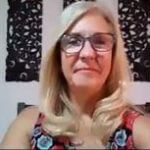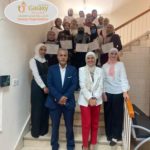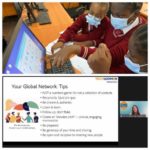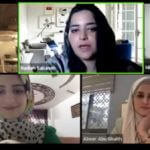Impact Stories from Professional Growth Policy Area

Mentor(s): Eileen Brewer
Policy Area(s): Empowering Women and Girls, Entrepreneurship, Professional Growth
This month, longtime mentor Eileen Brewer joined startup leaders
in a panel that explored best practices and challenges for womenled
startups and women entrepreneurs. The roundtable was
hosted by the Founder Institute, the world’s largest pre-seed
startup accelerator that has 21,000 mentors globally. Their
Female Founder Initiative aims to change the ratio of female
founders in over 65 countries.
Eileen is currently living in the Kurdistan Region of Iraq, serving as
the director of Takween Accelerator, the first accelerator in the
country that supports local startups. In the panel, “Female
Startup Leadership: Lessons Learned Accelerating Global
Companies,” Eileen spoke about her mission to provide women equal opportunities as founders, as well as her
work that provides training to founders globally. “I became an investor to make a difference,” she said. “I want
to help entrepreneurs in spaces where they have the least amount of resources.”
Report Date...: 7/5/21

Fellow trains 70 women from refugee camps in AI skills
Fellow(s): Reema Diab
Country: Jordan
Cohort: 2019
Policy Area(s): Economic Impact, Education Diplomacy/Mentoring, Empowering Women and Girls, Professional Growth
This week, 2019 fellow Reema Diab graduated 70 women from her
organization’s 2021 Artificial Intelligence Training Project, supporting them
in making their own products using innovative tools. Reema is the founder
and CEO of Galaxy Organization for Technology, an IT non- profit that
empowers women and youth with STEM skills.
The AI training was implemented in partnership with Jordan’s Ministry of
Digital Economy and Entrepreneurship, the European Union and
Plan International. For three months, the cohort of women in Al-Wehdat
refugee camp learned about AI and used 3D printers and laser cutting
machines; this was the first time an NGO in Jordan had access to 3D printing
technology for its participants. With the technology, the women made art,
products out of wood and more to sell and create income. Reema is
currently seeking resources to establish a 3D printing lab within Al-Wehdat
camp so women can more easily access the tools and create sustainable
income.
Report Date...: 7/5/21

Fellow featured in article as a prominent woman in STEM
Fellow(s): Madina Samakbaeva
Country: Kyrgyzstan
Cohort: 2020-2021
Policy Area(s): Empowering Women and Girls, Entrepreneurship, Professional Growth, Youth Engagement
2020-2021 fellow Madina Samakbaeva was recently featured in an article written in partnership between Girls in Science, Kyrgyzstan’s Child Protection Center and UNICEF. Madina is a quality control chemist for the Kyrgyz Republic’s Center for Veterinary Diagnostics and Expertise, as well as the founder of Easysciencekg, a platform that provides easy and accessible chemistry lessons to both children and adults. She has also contributed to TechWomen fellow-led Techaim, most recently creating a video for kids on determining pH and how it affects our health on their new STEAM channel, WeSTEAM. Beginning in 2019, Madina began volunteering with the Girls in Science Project, first creating STEM curriculum and now mentoring 12 girls on their career planning. “My TechWomen experience as a mentee has helped me to build and organize their mentorships,” she said.
In the article, Madina spoke about the challenges she faced as woman in chemistry, remembering how she was often told a career in science would interfere with getting married and having children. “Even those closest to me said, ‘You chose science, so, you will never build a family life,’” Madina said. “At the same time, none of them thought about what useful things I can do as I develop in science.” Madina also gave advice for youth in Kyrgyzstan who are considering STEM fields: “Science is not something unattainable. Do not be afraid to go into science — you need to be open, try and find your own way,” she said.
Report Date...: 6/28/21

Mentor(s): Mercedes Soria (Mentor)
Company: Knightscope
Policy Area(s): Empowering Women and Girls, Professional Growth
This week, TechWomen mentor Mercedes Soria authored an article for Forbes, sharing three strategies to help tackle the shortage of women in tech. In addition to serving as a Forbes council member, Mercedes is the EVP of software engineering and chief intelligence officer at Knightscope, an autonomous security robot company. Mercedes shares that although women account for 57% of all degrees, the number of women leaders in Fortune 500 companies is just 6.6%. “I have set to change this and invite the tech community to join me,” she writes. “From right here in the U.S. we can effect change around the entire world.” She writes about two programs – the Department of State’s U.S. Speaker Program and TechWomen – where she is able to empower women, provide them with opportunity and work towards gender equity. Through three proposed strategies – getting a diverse pool of candidates, ensuring women are represented in the C-suite and creating affinity groups for women – Mercedes hopes more companies can listen to women, support their success and foster their career growth.
Read More »Report Date...: 6/28/21

Fellows featured for International Women in Engineering Day
Fellow(s): Shakira Nyiratuza and Zani Gichuki
Country: Rwanda
Cohort: 2019
Policy Area(s): Empowering Women and Girls, Environmental Sustainability, Professional Growth
2019 fellows Shakira Nyiratuza and Zani Gichuki were featured in a video from MASS Design Group in celebration of International Women in Engineering Day, observed annually on June 23. Shakira and Zani both work as structural engineers at MASS, a U.S.-based architecture firm that leads purpose-driven projects, focuses on using sustainable materials and promotes local economies. In the video feature, Zani speaks about the importance of inclusivity in their field: “We need way more women in engineering in general,” she says. “We can’t expect people to build things the way we want them to be built if we don’t have a say in it.” Shakira shares that although the path to engineering is difficult, it is worth it: “Being an engineer is not an easy journey. However, it requires you to be focused, determined and never give up,” she says.
Read More »Report Date...: 6/28/21

At CodeHack fellows come together to support girls
Fellow(s): Ruth Kaveke and Joan Nabusoba
Country: Kenya
Cohort: 2017, 2020-2021
Policy Area(s): Education Diplomacy/Mentoring, Empowering Women and Girls, Entrepreneurship, Professional Growth, Youth Engagement
This week, fellows and co-founders of Pwani Teknowgalz Ruth Kaveke (2017) and Joan Nabusoba (2020-2021) invited three fellows to serve as judges for CodeHack, their latest project that trains young women with digital skills. With five STEM Café programs at American Corners throughout Kenya, coding classes, conferences and more, Pwani Teknowgalz aims to educate and empower girls through STEM education.
Their first CodeHack cohort – referred to as their “COVID-19 Edition” – worked with 150 young women ages 17 to 28 from marginalized communities in six Kenyan counties, training them in website development, mobile development and digital marketing. “This is geared toward empowering these young women in Kenya with technology skills that have proved crucial during this COVID-19 pandemic,” the fellows said. In the closing session, young women from the CodeHack cohort shared their mobile application solutions that solve community problems in front of a panel of judges that included fellows Serah Kahiu (2014), Alice Mbui (2015) and Gladys Maina (2020-2021). “All the three fellows are role models and mentors that the aspiring young women could connect to and seek further mentorship after the program,” said Ruth. Together the fellows judged the most innovative solutions that align with the UN SDG goals, giving the teams feedback and ultimately choosing the top three winners. “Whether you’re a semi-finalist or finalist, we still count all of you as a success,” said Joan. “We are celebrating all of you, and all your efforts.”
Report Date...: 6/21/21

Fellow leads session on financial independence for women
Fellow(s): Syeda Mehak
Country: Pakistan
Cohort: 2017
Policy Area(s): Economic Impact, Education Diplomacy/Mentoring, Entrepreneurship, Professional Growth
2017 fellow Syeda Mehak was featured in an Instagram Live session
on financial independence for women, sharing about her mission to
support women in STEM and beyond. The event was sponsored by
Every Day We are Hustling, a business that provides women
resources to achieve financial independence.
Syeda is the co-founder of ElleTech, a social enterprise for women
working in technology, education, art, math and science. Through
the ElleTech platform and its programs, Syeda hopes to train,
connect and amplify women in Pakistan. In the session, Syeda spoke
about ways women can use their skills and begin to earn online,
including using freelancing sites such as Upwork and Fiverr. “Since
you are your own boss, you have to have immense self-belief,” she told the audience. Despite its challenges,
Syeda emphasized that freelancing will often lead women to their goals of financial freedom. “The next step of
freelancing is entrepreneurship, which is amazing,” she said.
Report Date...: 6/21/21

Fellow’s social impact initiative wins youth award
Fellow(s): Hiba Awaysa
Country: Palestinian Territories
Cohort: 2020-2021
Policy Area(s): Economic Impact, Education Diplomacy/Mentoring, Entrepreneurship, Professional Growth, Youth Engagement
This week it was announced that Sawaed19, the initiative founded by 2020-2021
fellow Hiba Awaysa, was named a winner of the Taawon Youth Award, an award
that supports social entrepreneurs in the Palestinian Territories that are creating
both economic and societal impact. Sawaed19 was one of five winners selected
out of over 100 projects.
Hiba established Sawaed19 in 2019 with a mission to match volunteers to nonprofits
around the world. The Sawaed19 website allows users to search by
location, industry and company, supporting them in contributing to the volunteer
ecosystem in their communities. Through Sawaed19, Hiba hopes to empower her
local community, particuarly youth, to create positive change. She will use the
award funds to further develop the platform, adding features that better
facilitates the volunteering process and management. She’ll also create a new
outreach campaign to encourage volunteering. “When you give others some
time, effort, or money to help them get better life, your are actually investing to
yourself in return,” she says.
Report Date...: 6/21/21

TechWomen begins virtual delegation to Cameroon
Fellow(s): Cameroon fellows and mentor delegates
Country: Cameroon, United States
Policy Area(s): Education Diplomacy/Mentoring, Empowering Women and Girls, Entrepreneurship, Professional Growth, Youth Engagement
The TechWomen delegation to Cameroon has officially begun, bringing engaging events to young students, recent university graduates, women leaders, entrepreneurs and more. Although this year’s delegations are virtual, the mission remains the same as ever: to strengthen an international network of women in STEM fields, creating partnership and exchange between the United States and TechWomen program countries.
In a kick-off U.S Embassy Briefing, fellows and mentor delegates had the opportunity to hear from representatives of the U.S. Embassy in Yaounde about Cameroon, its tech landscape and their priorities within the region. Week two began with Branding and Networking in a Virtual Era, a session that brought together mentors, fellows and university students in STEM fields to talk about creating meaningful and lasting networks in a virtual world. Mentors presented on cultural intelligence, building an online brand and managing virtual teams and more. “Be your authentic self. Don’t try to be someone else when you are online — be who you are,” mentor Janice Campbell said in her talk. In the third event, Design Thinking and Physical Computing, mentors and fellows met with over 100 girls from both Douala and Yaounde to explore the power of tangible computing and constructionism through making. At the end of the day, the students shared out what they learned: “When I came here I learned how to create a game, I learned about design thinking, and I also learned about people and the things they invented,” said one student.
Report Date...: 6/14/21

In panel fellows share advice and inspiration for women
Fellow(s): Israa Mousa, Nadiah Sabaneh
Country: Palestinian Territories
Cohort: 2015, 2020-2021
Policy Area(s): Education Diplomacy/Mentoring, Empowering Women and Girls, Entrepreneurship, Professional Growth, Youth Engagement
2020-2021 fellow Israa Mousa and 2015 fellow Nadiah
Sabaneh were featured in an online panel for an event
that spotlighted inspiring women in the Palestinian
Territories who spoke about their challenges, resilience
and advice for women in technology. The event was
hosted and live-streamed on YouTube by Women in
Tech Dubai.
On the panel, Israa shared her achievements in tech
despite the barriers she has faced, speaking about how
she has supported young entrepreneurs in Gaza, empowered girls with digital inclusion skills and recently
launched a new startup that helps women bring their handicraft businesses online. “As humans we
underestimate ourselves and our efforts,” Israa said when asked about impostor syndrome. “Don’t be hard on
yourself, find the balance between work and family and your needs.” Nadiah, a tech hub manager, program
manager and mentor, spoke about her career path and her dedication to empowering women in her
community: “The reason is to pave the way for other women, so they don’t need to go through the same
challenges we went through,” she said.
Report Date...: 6/14/21

